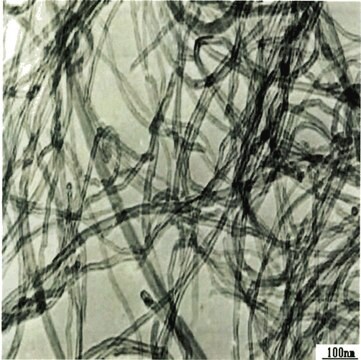750522
Carbon nanotube, single-walled
98% (Semiconducting), avg. no. of layers, 1
Sinónimos:
SWCNT
About This Item
Productos recomendados
Quality Level
assay
2% (Metallic)
98% (Semiconducting)
form
solid
feature
avg. no. of layers 1
manufacturer/tradename
NanoIntegris, Inc.
L
0.3-5 μm
diameter
1.2-1.7 nm
mp
3652-3697 °C (lit.)
density
1.7-1.9 g/cm3 at 25 °C (lit.)
SMILES string
[C]
¿Está buscando productos similares? Visita Guía de comparación de productos
General description
Application
- Electronics
- Sensors
- Composites
- Energy Storage
- Study of Life Science systems
Preparation Note
Legal Information
Storage Class
11 - Combustible Solids
wgk_germany
WGK 3
flash_point_f
Not applicable
flash_point_c
Not applicable
Elija entre una de las versiones más recientes:
¿Ya tiene este producto?
Encuentre la documentación para los productos que ha comprado recientemente en la Biblioteca de documentos.
Los clientes también vieron
Artículos
We presents an article concerning the applications of high-purity single-walled nanotubes in electronic and biomedical fields.
Carbon nanomaterials (CNMs), such as single-walled carbon nanotubes (SWCNTs), multi-walled carbon nanotubes (MWCNTs), and graphene (Figure 1), have diverse commercial applications including lighter and stronger composite materials, improved energy storage devices, more sensitive sensors, and smaller transistors.
Carbon nanotubes (CNTs) have received much attention since their discovery in 1991 by Sumio lijima1 due to their excellent mechanical, electrical, and optical properties.
A nanocomposite is typically defined as a mixture between a host material (e.g., polymer matrix) and nanofillers with at least one dimension of less than 100 nm.
Protocolos
Single-Walled Carbon Nanotubes synthesized by the Super-Growth Method & their properties & applications, including dispersing SGCNTs, SGCNT-polymer composites & SGCNT-metal composites are discussed.
Nuestro equipo de científicos tiene experiencia en todas las áreas de investigación: Ciencias de la vida, Ciencia de los materiales, Síntesis química, Cromatografía, Analítica y muchas otras.
Póngase en contacto con el Servicio técnico




